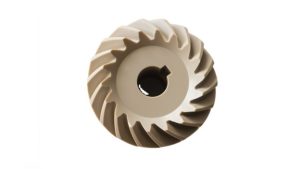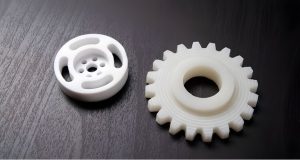Different plastic resins are compatible with CNC machining process, and each is suitable for machining finished parts and prototypes. These plastic materials are usually lightweight materials and suitable alternatives for metals in certain applications. Here are common plastic materials for CNC machining:
Acrylic

Bead Blasted Acrylic Parts
Acrylic or PMMA (Polymethyl methacrylate) offers various desirable material properties, including rigidity and optical clarity. PMMA is a reliable alternative for glass due to its high rigidity and transparency. It is a perfect CNC plastic material for different applications because it allows the production of precise machined parts with superior quality.
Although PMMA exhibits a high propensity for cracking and thermal softening, its adaptability and simplicity make it a suitable material for CNC machining tasks. Similarly, PMMA acrylic is less impact-resistant than Polycarbonate, even though it resists scratching. Typical applications of PMMA include display screens, lenses, food storage components, light pipes, and clear enclosures.
ABS

ABS CNC Part
ABS is the most economical plastic with a unique combination of material properties, including excellent machinability, tensile strength, and chemical and impact resistance. Product developers often choose ABS as the perfect CNC material for most plastic machined parts due to its versatility and cost-effectiveness. ABS plastic can withstand high temperatures for extended periods and is cheaper than most engineering plastics like PEEK.
Similarly, ABS material is best suited for applications where aesthetics is critical because it is easy to color. ABS is compatible with CNC applications, including rapid prototyping, protective enclosures, and fabrication of automotive parts. In addition to CNC machining, ABS material is also suitable for other manufacturing processes, such as 3D printing and injection molding.
Acetal
Acetal, Delrin, or POM, is a highly versatile CNC machining plastic with remarkable toughness, impact, and moisture resistance. Due to Delrin’s excellent fatigue resistance and stiffness, manufacturers often use POM to machine high-precision components such as valves, gears, and bearings.
Acetal maintains exceptional dimensional precision in machining parts of different dimensions and structures for various aerospace, automotive, and consumer goods applications. Acetal machined parts maintain superior mechanical properties and excellent resistance to environmental conditions.
Polycarbonate (PC)
Polycarbonate is another commonly used CNC machining plastic with several beneficial characteristics, including optical clarity. Aside from being heat- and shatter-resistant, Polycarbonate exhibits strong heat resistance, which makes it suitable for high-temperature applications. More so, polycarbonate is a commonly used CNC plastic for machining applications like medical devices, electronic components, and automotive parts.
Polyether ketone (PEEK)

Medical Grade PEEK Component
PEEK is a high-strength CNC machining plastic with unique properties such as excellent chemical resistance, high mechanical strength, and dimensional stability. This engineering plastic is well suited for use in extreme environments because it maintains stiffness at extreme temperatures.
Product manufacturers across different industries often use PEEK in food and beverage processing, aerospace, and oil and gas industries. In addition, it is widely embraced in fabricating bushings, pump and valve components, seals, semiconductor components, and bearings. This high-performance plastic resin is best suited for machining lightweight fixtures since it doesn’t deform or creep over time.
Polypropylene (PP)
Polypropylene is an adaptable CNC machining plastic with excellent fatigue strength and high chemical resistance. Besides, PP is a medical-grade CNC machining material. CNC-machined polypropylene parts offer a smooth surface finish. However, PP softens easily upon exposure to high temperatures, resulting in machining complications.
Polyvinyl Chloride (PVC)
PVC is an affordable CNC plastic with an excellent machinability rating. Its high strength makes it stiff and resistant to high impact. Similarly, PVC material is suitable for fabricating welded chemical tanks, cabinet and working surfaces, valve and pump housings, fittings, and manifolds. Plastic machined parts manufacturers widely use PVC for applications that require high corrosion and chemical resistance.
Nylon

Nylon Machined Parts
This plastic resin is amongst the strongest and most durable plastic CNC machining materials. Its excellent impact resistance makes it compatible with several applications. It exhibits great lubricating properties and is available in different composite forms, including glass-fiber-reinforced nylon. Nylon material is particularly suitable for applications that require protection from frictional forces. Sliding surfaces, bearings, gears, and sprockets are typical nylon machined parts. Moisture absorption is one of the major drawbacks of nylon. Hence, it is not an ideal option for marine applications.
If you have any plastic prototyping project, please feel free to contact: joyce@beisi-rapid.com.
